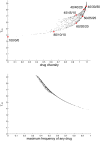Benefits of using multiple first-line therapies against malaria
- PMID: 18780786
- PMCID: PMC2544604
- DOI: 10.1073/pnas.0804628105
Benefits of using multiple first-line therapies against malaria
Abstract
Despite the availability of many drugs and therapies to treat malaria, many countries' national policies recommend using a single first-line therapy for most clinical malaria cases. To assess whether this is the best strategy for the population as a whole, we designed an evolutionary-epidemiological modeling framework for malaria and compared the benefits of different treatment strategies in the context of resistance evolution. Our results show that the population-wide use of multiple first-line therapies (MFT) against malaria yields a better clinical outcome than using a single therapy or a cycling strategy where therapies are rotated, either on a fixed cycling schedule or when resistance levels or treatment failure become too high. MFT strategies also delay the emergence and slow the fixation of resistant strains (phenotypes), and they allow a larger fraction of the population to be treated without trading off future treatment of cases that may be untreatable because of high resistance levels. Earlier papers have noted that cycling strategies have the disadvantage of creating a less temporally variable environment than MFT strategies, making resistance evolution easier for the parasite. Here, we illustrate a second feature of parasite ecology that impairs the performance of cycling policies, namely, that cycling policies degrade the mean fitness of the parasite population more quickly than MFT policies, making it easier for new resistant types to invade and spread. The clinical benefits of using multiple first-line therapies against malaria suggest that MFT policies should play a key role in malaria elimination and control programs.
Conflict of interest statement
The authors declare no conflict of interest.
Figures






Similar articles
-
Drug resistance among malaria and other parasites.Infect Dis Clin North Am. 1997 Dec;11(4):969-87. doi: 10.1016/s0891-5520(05)70400-1. Infect Dis Clin North Am. 1997. PMID: 9421710 Review.
-
Policy options for deploying anti-malarial drugs in endemic countries: a population genetics approach.Malar J. 2012 Dec 17;11:422. doi: 10.1186/1475-2875-11-422. Malar J. 2012. PMID: 23244624 Free PMC article.
-
Considerations on the mechanism of action of artemisinin antimalarials: part 1--the 'carbon radical' and 'heme' hypotheses.Infect Disord Drug Targets. 2013 Aug;13(4):217-77. doi: 10.2174/1871526513666131129155708. Infect Disord Drug Targets. 2013. PMID: 24304352 Review.
-
Epidemiological models for the spread of anti-malarial resistance.Malar J. 2003 Feb 19;2:3. doi: 10.1186/1475-2875-2-3. Epub 2003 Feb 19. Malar J. 2003. PMID: 12643812 Free PMC article.
-
Spread of anti-malarial drug resistance: mathematical model with implications for ACT drug policies.Malar J. 2008 Nov 2;7:229. doi: 10.1186/1475-2875-7-229. Malar J. 2008. PMID: 18976503 Free PMC article.
Cited by
-
Comparing the impact of artemisinin-based combination therapies on malaria transmission in sub-Saharan Africa.Am J Trop Med Hyg. 2015 Mar;92(3):555-60. doi: 10.4269/ajtmh.14-0490. Epub 2015 Jan 26. Am J Trop Med Hyg. 2015. PMID: 25624402 Free PMC article.
-
"One-size-fits-all"? Optimizing treatment duration for bacterial infections.PLoS One. 2012;7(1):e29838. doi: 10.1371/journal.pone.0029838. Epub 2012 Jan 11. PLoS One. 2012. PMID: 22253798 Free PMC article.
-
Antimalarial mass drug administration in large populations and the evolution of drug resistance.PLOS Glob Public Health. 2023 Jul 26;3(7):e0002200. doi: 10.1371/journal.pgph.0002200. eCollection 2023. PLOS Glob Public Health. 2023. PMID: 37494337 Free PMC article.
-
Molecular markers of artemisinin resistance during falciparum malaria elimination in Eastern Myanmar.Malar J. 2024 May 8;23(1):138. doi: 10.1186/s12936-024-04955-6. Malar J. 2024. PMID: 38720269 Free PMC article.
-
The Community As the Patient in Malaria-Endemic Areas: Preempting Drug Resistance with Multiple First-Line Therapies.PLoS Med. 2016 Mar 29;13(3):e1001984. doi: 10.1371/journal.pmed.1001984. eCollection 2016 Mar. PLoS Med. 2016. PMID: 27022739 Free PMC article.
References
-
- Gregson A, Plowe CV. Mechanisms of resistance of malaria parasites to antifolates. Pharmacol Rev. 2005;57:117–145. - PubMed
-
- White NJ, et al. Averting a malaria disaster. Lancet. 1999;353:1965–1967. - PubMed
-
- White NJ. Qinghaosu (Artemisinin): The price of Success. Science. 2008;320:330–334. - PubMed
-
- Institute of Medicine. Saving Lives, Buying Time. Washington, DC: Natl Academies Press; 2004.
Publication types
MeSH terms
Substances
Grants and funding
LinkOut - more resources
Full Text Sources
Other Literature Sources
Medical

